-
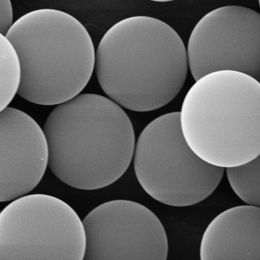 Silica Microspheres - Dry, 0.3µmCatalog Number 25341
Silica Microspheres - Dry, 0.3µmCatalog Number 25341Monodisperse silica microspheres in dry form. Available in nominal diameters ranging from: 0.3 - 6.0µm. (100% solids) also available see: Silica Microspheres
-
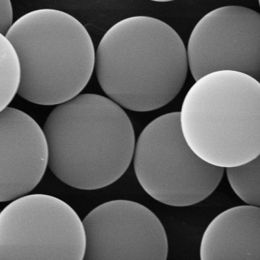 Silica Microspheres - Dry, 0.5µmCatalog Number 25342
Silica Microspheres - Dry, 0.5µmCatalog Number 25342Monodisperse silica microspheres in dry form. Available in nominal diameters ranging from: 0.3 - 6.0µm. (100% solids) also available see: Silica Microspheres
-
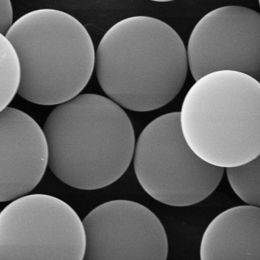 Silica Microspheres - Dry, 1.0µmCatalog Number 25343
Silica Microspheres - Dry, 1.0µmCatalog Number 25343Monodisperse silica microspheres in dry form. Available in nominal diameters ranging from: 0.3 - 6.0µm. (100% solids) also available see: Silica Microspheres
-
 Silica Microspheres - Dry, 1.5µmCatalog Number 25344
Silica Microspheres - Dry, 1.5µmCatalog Number 25344Monodisperse silica microspheres in dry form. Available in nominal diameters ranging from: 0.3 - 6.0µm. (100% solids) also available see: Silica Microspheres
-
 Silica Microspheres - Dry, 2.5µmCatalog Number 25345
Silica Microspheres - Dry, 2.5µmCatalog Number 25345Monodisperse silica microspheres in dry form. Available in nominal diameters ranging from: 0.3 - 6.0µm. (100% solids) also available see: Silica Microspheres
-
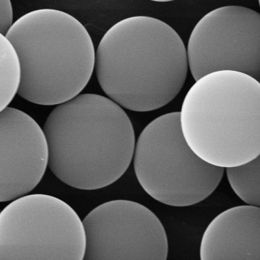 Silica Microspheres - Dry, 3.0µmCatalog Number 25346
Silica Microspheres - Dry, 3.0µmCatalog Number 25346Monodisperse silica microspheres in dry form. Available in nominal diameters ranging from: 0.3 - 6.0µm. (100% solids) also available see: Silica Microspheres
-
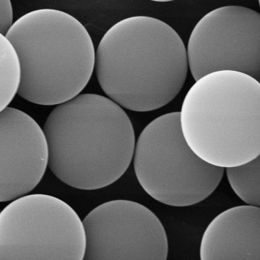 Silica Microspheres - Dry, 4.0µmCatalog Number 25347
Silica Microspheres - Dry, 4.0µmCatalog Number 25347Monodisperse silica microspheres in dry form. Available in nominal diameters ranging from: 0.3 - 6.0µm. (100% solids) also available see: Silica Microspheres
-
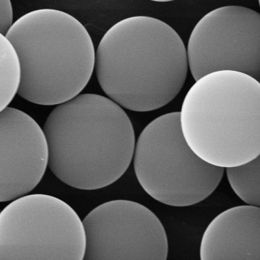 Silica Microspheres - Dry, 5.0µmCatalog Number 25348
Silica Microspheres - Dry, 5.0µmCatalog Number 25348Monodisperse silica microspheres in dry form. Available in nominal diameters ranging from: 0.3 - 6.0µm.
-
 Silica Microspheres, 0.15μmCatalog Number 24320
Silica Microspheres, 0.15μmCatalog Number 24320Inorganic supports such as silica microspheres have become increasingly important for a variety of applications, including isolation of nucleic acids, cell separation, and immuno- and DNA-based assays. They offer the combined benefits of a broad platform and the unique properties of a silica substrate, such as flexible silanization chemistries, low autofluorescence, and low nonspecific binding of proteins.
Polysciences offers uniform, non-porous silica (SiO2) microspheres available in nominal diameters of ~150nm -5µm. These particles typically have size CVs of 10-15%. Supplied in aqueous suspension of 10% solids.
-
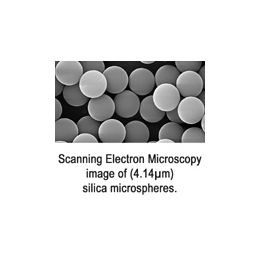 Silica Microspheres, 0.30μmCatalog Number 24321
Silica Microspheres, 0.30μmCatalog Number 24321Inorganic supports such as silica microspheres have become increasingly important for a variety of applications, including isolation of nucleic acids, cell separation, and immuno- and DNA-based assays. They offer the combined benefits of a broad platform and the unique properties of a silica substrate, such as flexible silanization chemistries, low autofluorescence, and low nonspecific binding of proteins.
Polysciences offers uniform, non-porous silica (SiO2) microspheres available in nominal diameters of ~150nm -5µm. These particles typically have size CVs of 10-15%. Supplied in aqueous suspension of 10% solids.
-
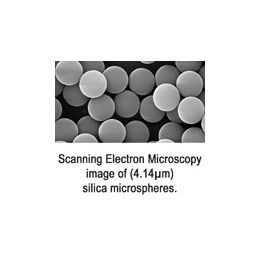 Silica Microspheres, 0.40µmCatalog Number 24322
Silica Microspheres, 0.40µmCatalog Number 24322Inorganic supports such as silica microspheres have become increasingly important for a variety of applications, including isolation of nucleic acids, cell separation, and immuno- and DNA-based assays. They offer the combined benefits of a broad platform and the unique properties of a silica substrate, such as flexible silanization chemistries, low autofluorescence, and low nonspecific binding of proteins.
Polysciences offers uniform, non-porous silica (SiO2) microspheres available in nominal diameters of ~150nm -5µm. These particles typically have size CVs of 10-15%. Supplied in aqueous suspension of 10% solids.
-
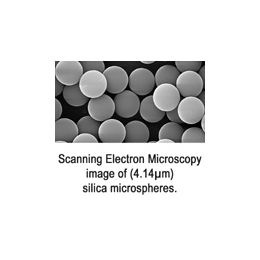 Silica Microspheres, 0.70μmCatalog Number 24324
Silica Microspheres, 0.70μmCatalog Number 24324Inorganic supports such as silica microspheres have become increasingly important for a variety of applications, including isolation of nucleic acids, cell separation, and immuno- and DNA-based assays. They offer the combined benefits of a broad platform and the unique properties of a silica substrate, such as flexible silanization chemistries, low autofluorescence, and low nonspecific binding of proteins.
-
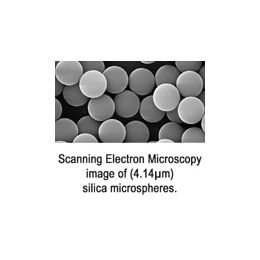 Silica Microspheres, 0.90μmCatalog Number 24325
Silica Microspheres, 0.90μmCatalog Number 24325Inorganic supports such as silica microspheres have become increasingly important for a variety of applications, including isolation of nucleic acids, cell separation, and immuno- and DNA-based assays. They offer the combined benefits of a broad platform and the unique properties of a silica substrate, such as flexible silanization chemistries, low autofluorescence, and low nonspecific binding of proteins.
-
 Silica Microspheres, 1.0μmCatalog Number 24326
Silica Microspheres, 1.0μmCatalog Number 24326Inorganic supports such as silica microspheres have become increasingly important for a variety of applications, including isolation of nucleic acids, cell separation, and immuno- and DNA-based assays. They offer the combined benefits of a broad platform and the unique properties of a silica substrate, such as flexible silanization chemistries, low autofluorescence, and low nonspecific binding of proteins.
Polysciences offers uniform, non-porous silica (SiO2) microspheres available in nominal diameters of ~150nm -5µm. These particles typically have size CVs of 10-15%.
-
 Silica Microspheres, 1.5μmCatalog Number 24327
Silica Microspheres, 1.5μmCatalog Number 24327Inorganic supports such as silica microspheres have become increasingly important for a variety of applications, including isolation of nucleic acids, cell separation, and immuno- and DNA-based assays. They offer the combined benefits of a broad platform and the unique properties of a silica substrate, such as flexible silanization chemistries, low autofluorescence, and low nonspecific binding of proteins.
-
 Silica Microspheres, 2.0μmCatalog Number 24328
Silica Microspheres, 2.0μmCatalog Number 24328Inorganic supports such as silica microspheres have become increasingly important for a variety of applications, including isolation of nucleic acids, cell separation, and immuno- and DNA-based assays. They offer the combined benefits of a broad platform and the unique properties of a silica substrate, such as flexible silanization chemistries, low autofluorescence, and low nonspecific binding of proteins.
-
 Silica Microspheres, 2.5μmCatalog Number 24329
Silica Microspheres, 2.5μmCatalog Number 24329Inorganic supports such as silica microspheres have become increasingly important for a variety of applications, including isolation of nucleic acids, cell separation, and immuno- and DNA-based assays. They offer the combined benefits of a broad platform and the unique properties of a silica substrate, such as flexible silanization chemistries, low autofluorescence, and low nonspecific binding of proteins.
-
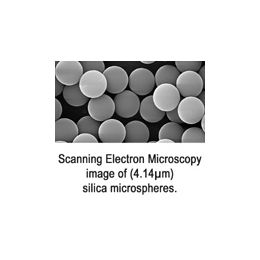 Silica Microspheres, 3.0μmCatalog Number 24330
Silica Microspheres, 3.0μmCatalog Number 24330Inorganic supports such as silica microspheres have become increasingly important for a variety of applications, including isolation of nucleic acids, cell separation, and immuno- and DNA-based assays. They offer the combined benefits of a broad platform and the unique properties of a silica substrate, such as flexible silanization chemistries, low autofluorescence, and low nonspecific binding of proteins.
Polysciences offers uniform, non-porous silica (SiO2) microspheres available in nominal diameters of ~150nm -5µm. These particles typically have size CVs of 10-15%.
-
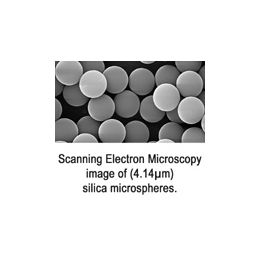 Silica Microspheres, 4.0μmCatalog Number 24331
Silica Microspheres, 4.0μmCatalog Number 24331Inorganic supports such as silica microspheres have become increasingly important for a variety of applications, including isolation of nucleic acids, cell separation, and immuno- and DNA-based assays. They offer the combined benefits of a broad platform and the unique properties of a silica substrate, such as flexible silanization chemistries, low autofluorescence, and low nonspecific binding of proteins.
Polysciences offers uniform, non-porous silica (SiO2) microspheres available in nominal diameters of ~150nm -5µm. These particles typically have size CVs of 10-15%.
-
 Silica Microspheres, 5.0μmCatalog Number 24332
Silica Microspheres, 5.0μmCatalog Number 24332Inorganic supports such as silica microspheres have become increasingly important for a variety of applications, including isolation of nucleic acids, cell separation, and immuno- and DNA-based assays. They offer the combined benefits of a broad platform and the unique properties of a silica substrate, such as flexible silanization chemistries, low autofluorescence, and low nonspecific binding of proteins.
-
 Silica Microspheres, Amine, 0.5μmCatalog Number 24756
Silica Microspheres, Amine, 0.5μmCatalog Number 24756Silica Microspheres, amine-functionalized, 100% solids, 0.5µm
These silica microspheres are available with a nominal diameter of 0.5µm to allow the researcher to tailor his/her product design for specific assays.
-
 Silica Microspheres, Amine, 1.0μmCatalog Number 24757
Silica Microspheres, Amine, 1.0μmCatalog Number 24757Silica Microspheres, amine-functionalized, 100% solids, 1.0µm
These silica microspheres are available with a nominal diameter of 1.0µm to allow the researcher to tailor his/her product design for specific assays.
-
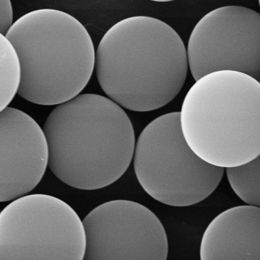 Silica Microspheres, Amine, 5.0μmCatalog Number 24758
Silica Microspheres, Amine, 5.0μmCatalog Number 24758Silica Microspheres, amine-functionalized, 100% solids, 5.0µm
These silica microspheres are available with a nominal diameter of 5.0µm to allow the researcher to tailor his/her product design for specific assays.
-
 Silica Microspheres, Carboxyl, 0.5μmCatalog Number 24753
Silica Microspheres, Carboxyl, 0.5μmCatalog Number 24753Silica Microspheres, carboxyl-functionalized, 100% solids, 0.5µm
These silica microspheres are available with a nominal diameter of 0.5µm to allow the researcher to tailor his/her product design for specific assays.
-
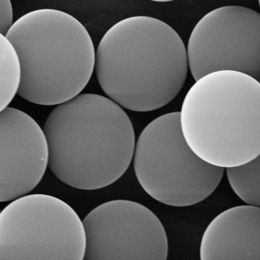 Silica Microspheres, Carboxyl, 1.0μmCatalog Number 24754
Silica Microspheres, Carboxyl, 1.0μmCatalog Number 24754Silica Microspheres, carboxyl-functionalized, 100% solids, 1.0µm
These silica microspheres are available with a nominal diameter of 1.0µm to allow the researcher to tailor his/her product design for specific assays.
-
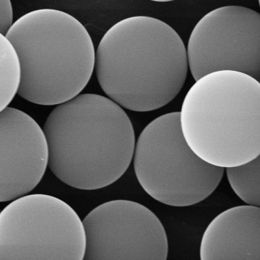 Silica Microspheres, Carboxyl, 5.0μmCatalog Number 24755
Silica Microspheres, Carboxyl, 5.0μmCatalog Number 24755Silica Microspheres, carboxyl-functionalized, 100% solids, 5.0µm
These silica microspheres are available with a nominal diameter of 5.0µm to allow the researcher to tailor his/her product design for specific assays.
-
 Silica Microspheres, Streptavidin, 0.5µmCatalog Number 24759
Silica Microspheres, Streptavidin, 0.5µmCatalog Number 24759Silica Microspheres, streptavidin-modified, 1% solids, 0.5µm
Streptavidin-modified microspheres bind biotinylated ligands easily and with great affinity. They are offered as a 1% dispersion in water.
-
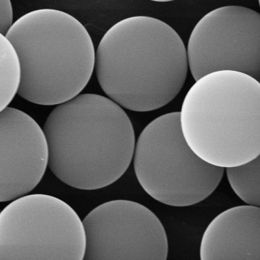 Silica Microspheres, Streptavidin, 1.0µmCatalog Number 24760
Silica Microspheres, Streptavidin, 1.0µmCatalog Number 24760Silica Microspheres, streptavidin-modified, 1% solids, 1.0µm
Streptavidin-modified microspheres bind biotinylated ligands easily and with great affinity. They are offered as a 1% dispersion in water.
-
 Silica Microspheres, Streptavidin, 5.0µmCatalog Number 24761
Silica Microspheres, Streptavidin, 5.0µmCatalog Number 24761Silica Microspheres, streptavidin-modified, 1% solids, 5.0µm
Streptavidin-modified microspheres bind biotinylated ligands easily and with great affinity. They are offered as a 1% dispersion in water.
These silica microspheres are available with a nominal diameter of 5.0µm to allow the researcher to tailor his/her product design for specific assays.
-
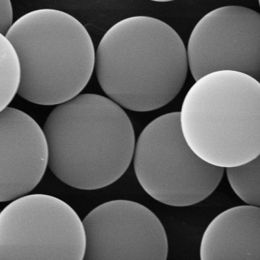 Silica Microspheres, 0.01μm (broad distribution, colloidal)Catalog Number 24298
Silica Microspheres, 0.01μm (broad distribution, colloidal)Catalog Number 24298Polysciences offers colloidal silica microspheres packaged as economical 5% solids dispersion of amorphous silica particles in water with NaOH as a stabilizer. One of the advantages of silica microspheres over polymer microspheres is their exceptional stability. Also, the surface of silica microspheres can be easily functionalized by reaction with organosilanes.
-
 Silica Microspheres, 0.05μm (colloidal)Catalog Number 24040
Silica Microspheres, 0.05μm (colloidal)Catalog Number 24040Polysciences offers colloidal silica microspheres packaged as economical 5% solids dispersion of amorphous silica particles in water with NaOH as a stabilizer. One of the advantages of silica microspheres over polymer microspheres is their exceptional stability. Also, the surface of silica microspheres can be easily functionalized by reaction with organosilanes.
0.05µm ± 0.01µm
-
 Silica Microspheres, 0.10μm (colloidal)Catalog Number 24041
Silica Microspheres, 0.10μm (colloidal)Catalog Number 24041Polysciences offers colloidal silica microspheres packaged as economical 5% solids dispersion of amorphous silica particles in water with NaOH as a stabilizer. One of the advantages of silica microspheres over polymer microspheres is their exceptional stability. Also, the surface of silica microspheres can be easily functionalized by reaction with organosilanes.
0.10µm ± 0.03µm
-
 Silica Microspheres, 0.50μmCatalog Number 24323
Silica Microspheres, 0.50μmCatalog Number 24323Inorganic supports such as silica microspheres have become increasingly important for a variety of applications, including isolation of nucleic acids, cell separation, and immuno- and DNA-based assays. They offer the combined benefits of a broad platform and the unique properties of a silica substrate, such as flexible silanization chemistries, low autofluorescence, and low nonspecific binding of proteins.
Polysciences offers uniform, non-porous silica (SiO2) microspheres available in nominal diameters of ~150nm -5µm. These particles typically have size CVs of 10-15%. Supplied in aqueous suspension of 10% solids.
Silica Microspheres
